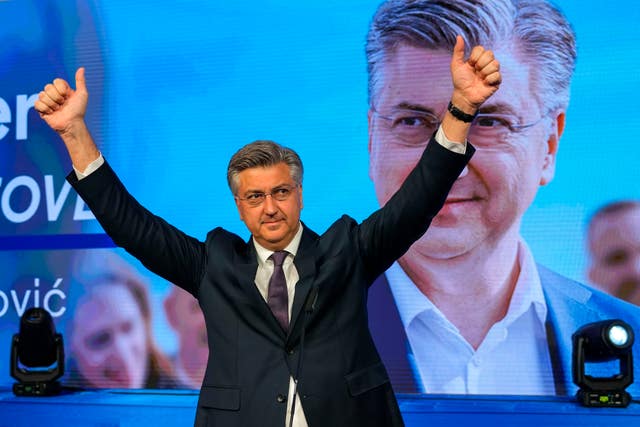Croatia’s ruling conservatives win parliamentary vote but cannot rule alone
The election centred on a bitter rivalry between the country’s president and prime minister.

Croatia’s governing conservatives convincingly won a highly contested parliamentary election on Wednesday, but according to the official vote count, they will still need support from far-right groups to stay in power.
The election followed a campaign that centred on a bitter rivalry between the country’s president and prime minister.
The ballot pitted the ruling conservative Croatian Democratic Union, or HDZ, led by prime minister Andrej Plenkovic, against an alliance of centrist and left-wing parties informally led by populist president Zoran Milanovic and his Social Democratic Party, or SDP.

“Starting tomorrow morning, we will start forming a new parliamentary majority in order to form our third government,” Mr Plenkovic said in his victory speech.
“I want to congratulate the other parties that were defeated by the HDZ.”
Turnout was more than 50% — a record — hours before the polls closed.
The election was held as Croatia, a European Union and Nato member, struggles with the highest inflation rate in the eurozone, a labour shortage, illegal migration and reports of widespread corruption.
At stake in the race for Croatia’s 151-seat parliament was not just the Adriatic Sea country’s future domestic policies, but also the EU’s unity as it grapples with the instability from Russia’s full-scale invasion of Ukraine.
If the HDZ stays in power as expected, the country will continue on a pro-Western course in supporting Ukraine in its fight against Russia.
Success for SDP could put it on track for victory in the European Parliament election in June and the presidential election in December.
It would shake the HDZ’s long dominance of politics and potentially open space for stronger pro-Russia influence in the country, akin to Hungary and Slovakia.
The HDZ has largely held office since Croatia gained independence from the former Yugoslavia in 1991. The Balkan nation became the newest member of the European Union in 2013 and joined Europe’s passport-free travel area and the eurozone last year.
In Croatia, the president plays a largely ceremonial role, while the prime minister exerts most of the political power.





